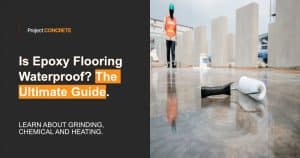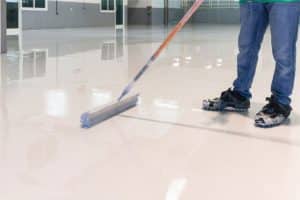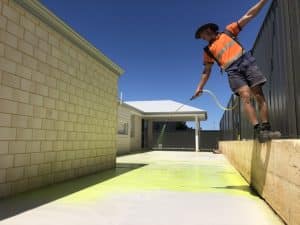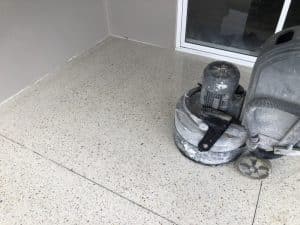
Looking for a floor that won’t get ruined by water? Epoxy flooring is a great choice because it’s made to resist water. This is really helpful for places that often get wet or have a lot of humidity.
In this article, we’ll talk about the different kinds of epoxy flooring options you can choose from, where they work best, and what you should think about to pick the right waterproof epoxy flooring solutions for your space. Whether it’s for a busy kitchen, a damp basement, or a large factory, we’ll help you understand why epoxy flooring is a smart choice for keeping things dry and lasting a long time
Understanding Epoxy Flooring: Waterproof Capabilities
Epoxy flooring is recognized for its robust water resistance capabilities, which are primarily due to its unique composition. The mixture of resin and hardening agents in epoxy flooring forms a durable seal, effectively repelling liquids and preventing water infiltration. This makes epoxy flooring systems an outstanding choice for areas needing strong water resistance among various flooring options.
But what exactly does “waterproof” entail? And how does it differ from being watertight?
Watertight vs Waterproof
it’s crucial to distinguish between “waterproof” and “watertight” when discussing epoxy flooring’s capabilities. Waterproof flooring, including certain types of epoxy, is designed to completely prevent water penetration. This means that water, moisture, and liquids cannot penetrate the flooring material to its core, ensuring that the floor remains undamaged even if water sits on its surface for extended periods.
On the other hand, watertight flooring aims to prevent water from passing through its surface, including the seams. It is tightly constructed so that water cannot enter or escape the material. This type of flooring is typically used in areas where absolute water resistance is critical, such as in swimming pools, commercial kitchens, or industrial facilities. Watertight flooring often involves more specialized materials and a complex installation process to achieve its high level of water resistance
Waterproof Options
Epoxy flooring is a popular waterproof option known for its seamless and protective surface, commonly used in areas like basements and garages. It creates a protective layer that shields the floor from water damage, enhancing overall durability. In contrast, water-resistant flooring is better suited for areas with lower moisture levels and can handle spills or moisture only for a limited time. If exposed to water for prolonged periods, water-resistant floors may allow water to penetrate, causing potential damage.
When choosing between waterproof and watertight flooring, or even water-resistant options, it’s essential to consider the specific requirements of the space, budget constraints, and aesthetic preferences. Waterproof and watertight floors are ideal for high-moisture environments, offering long-term durability and protection against water damage. In contrast, water-resistant flooring can be a more cost-effective and practical choice for areas where water exposure is minimal or occasional.

Types of Waterproof Epoxy Flooring Systems
When considering waterproof epoxy flooring, it’s important to understand that there are several different types available, each with its own unique characteristics, benefits and applications. These types include self-levelling epoxy, mortar epoxy, anti-static epoxy, and flaked epoxy.
Self-levelling Epoxy
Self-levelling epoxy is a top choice for creating an even and smooth surface in various settings. This flooring type is applied as a liquid and naturally levels itself out, resulting in a seamless and polished finish. Ideal for commercial and industrial spaces, self-levelling epoxy addresses uneven floors and provides both aesthetic and functional benefits.
Mortar Epoxy
Mortar epoxy is known for its exceptional durability and strength. This flooring type combines epoxy resin and hardeners, forming a robust coating capable of handling heavy loads and resisting chemical damage. Mortar epoxy is particularly useful in industrial environments and is also an excellent choice for repairing damaged concrete floors, thanks to its quick-drying and crack-filling capabilities.
Anti-static Epoxy
In environments where electrostatic discharge is a concern, anti-static epoxy flooring is an effective solution. This flooring type incorporates conductive materials that help disperse static electricity, protecting sensitive electronic equipment. Anti-static epoxy floor, is ideal for areas with delicate electronic devices and offers the same high-quality characteristics as traditional epoxy flooring.
Flaked Epoxy
For those seeking a decorative flooring option, flaked epoxy is an attractive choice. This flooring involves embedding colored flakes into the epoxy, creating a unique, seamless, multi-colored, and textured appearance. Beyond its aesthetic appeal, flaked epoxy also offers slip resistance, making it suitable for areas prone to moisture or spills, such as kitchens, bathrooms, and industrial settings with potential hazards.

Applications of Waterproof Epoxy Flooring
Epoxy flooring is a versatile solution that goes beyond just aesthetic appeal, making it suitable for residential, commercial, and industrial environments. Its waterproof characteristics and durability cater to a wide range of practical and decorative needs in different settings.
Residential Spaces
In homes, especially in areas like basements or lower levels where moisture and water exposure are common, epoxy flooring is a practical choice. It’s known for its water resistance and easy maintenance, which makes it a dependable option for homeowners. The ability of epoxy floors to resist moisture helps in protecting these areas from water damage, mold, and mildew growth.
Commercial Spaces
For commercial areas, epoxy flooring stands out due to its resilience against water, low maintenance, and heat resistance. It’s particularly beneficial in places frequently exposed to water, like amenities blocks, pool areas, and restrooms. Besides its practical advantages, epoxy flooring enhances the professional appearance of commercial spaces. Its aesthetic qualities can elevate the ambiance, adding sophistication while still offering protection against moisture and heavy foot in high traffic areas.
Industrial Spaces
In industrial settings, the strength and durability of epoxy flooring are unmatched. It can withstand heavy machinery, water damage, and extensive wear, making it a superior choice over other flooring options in these environments. The robust nature of epoxy flooring is evident in industrial applications where longevity and resistance to harsh conditions are crucial. It effectively handles the demands of industrial operations, from manufacturing floors to warehouses, providing a reliable and long-lasting flooring solution.

Advantages and Disadvantages of Epoxy Flooring
When considering epoxy flooring, it’s crucial to assess both its advantages and disadvantages to make an informed decision.
Advantages
- Water Resistance: Epoxy flooring is exceptionally resistant to water and moisture, making it ideal for spaces prone to spills or humidity.
- Durability: It is known for its long-lasting quality, capable of withstanding heavy traffic and wear over time.
- Stain Resistance: Epoxy floors are highly resistant to stains and spills, which can be easily wiped away without leaving marks.
- Low Maintenance: Regular sweeping and light mopping are usually sufficient for maintenance, making it a practical choice for busy environments.
- Customization: There are numerous customization options for epoxy flooring, including colours, patterns, and the addition of logos or graphics, allowing for both functionality and aesthetic appeal.
Disadvantages
- Sensitivity to UV Light: One notable drawback is epoxy flooring’s tendency to yellow or fade when exposed to UV light or direct sunlight.
- Difficult Removal: Once installed, epoxy flooring can be challenging to remove or replace, requiring significant effort and possibly professional assistance.
- Slippery When Wet: Although generally slip-resistant, epoxy floors can become slippery when wet, especially if not textured during installation.
- Application Time: The installation process can be time-consuming, as epoxy requires proper preparation of the concrete surface and adequate drying time.

Waterproof Epoxy Flooring Installation and Maintenance
Understanding the installation, application process and maintenance of waterproof epoxy flooring is crucial, whether it’s for a residential or commercial setting.
Installation
- Surface Preparation: The key to a successful epoxy flooring installation starts with surface preparation. The substrate needs to be clean, dry, and free of any grease, oil, or previous coatings. This ensures optimal adhesion of the epoxy to the surface.
- Application Tools: Utilizing the right tools, such as squeegees and spiked rollers, is essential for uniform application. These tools help in evenly spreading the epoxy and eliminating air bubbles, which are crucial for a smooth finish.
- Curing Time: Epoxy flooring requires adequate curing time. Rushing this process can lead to issues like improper adhesion or an uneven surface. It’s important to follow the manufacturer’s recommended curing time for the best results.
Maintenance
- Regular Cleaning: Routine cleaning with a soft broom or a dust mop is usually sufficient to keep the floor clean. Avoid using abrasive tools that might scratch the surface.
- Avoid Soap-Based Cleaners: Soap-based cleaners can leave a residue on epoxy floors, making them look cloudy or dull. Instead, use a mild, non-soap-based cleaner for regular cleaning.
- Removing Stains and Spills: For tougher stains or spills, a lactic acid-based cleaner can be effective. Always test cleaning products on a small area first to ensure they do not damage the epoxy.
- Dealing with Tire Marks: In areas like garages where tire marks are common, using a degreaser can help in removing these stubborn stains without damaging the epoxy coating.
By following these installation and maintenance guidelines, you can ensure that your waterproof vinyl epoxy flooring remains in excellent condition, retaining its beauty and functionality for many years. Proper installation is key to longevity, while regular and appropriate maintenance will keep the flooring looking its best.
Customizing Epoxy Floors for Specific Needs
When it comes to installing epoxy flooring, there is no need for a generic approach. It can be personalized according to your specific needs, whether you require slip resistance or chemical resistance.
It’s important to understand how you can modify your epoxy flooring to suit your individual requirements. This may include enhancing its grip and durability against chemicals through tailored techniques, colours and materials.
Slip Resistance
For areas where safety is a priority, enhancing the slip resistance of epoxy floors and tiles is crucial. This can be achieved by adding certain materials during the installation process:
Dimple, Silica Sand, Aluminum Oxide, or Colored Quartz: Incorporating these materials into the epoxy mixture can significantly improve traction. This results in a surface that is less prone to causing slips and falls, making it safer for users in wet or high-traffic areas
Chemical Resistance
Customizing your epoxy flooring also involves considering its resistance to chemicals. Seeking guidance from an expert contractor like the team at Project Concrete can lead you to a custom-made, durable blend of epoxy that is specifically designed for the type and amount of chemical exposure in your space. Such customized solutions are crucial in safeguarding both the surface layer and underlying structure damaged concrete floors against any potential harm caused by corrosive chemicals.
- Expert Consultation: Consulting with our professional contractors can provide insights into the best epoxy mix for your specific needs is essential. They can recommend a blend that withstands the types and levels of chemical exposure in your space.
- Tailored Epoxy Mixes: We can create custom epoxy blends designed to resist specific chemicals, ensuring the longevity of the flooring and protecting both the surface and the structure underneath from potential damage caused by corrosive substances.
Summary
Frequently Asked Questions
Will water ruin an epoxy floor?
Although epoxy is resistant to water, it should not be left standing for a prolonged period as this can potentially cause harm by seeping through any cracks or unsealed sections. It is important to take proper precautions and regularly check for damages in order to maintain the effectiveness of epoxy’s resistance to water.
What are the disadvantages of epoxy resin flooring?
Epoxy flooring is a long-lasting option. It does have a limited lifespan and may require reinstallation at some point due to wear and tear. To maintain its performance over time, regular upkeep and eventual replacement are essential.
Despite being known for its durability, epoxy flooring will eventually reach the end of its lifespan. This means that routine maintenance alone cannot guarantee sustained quality in the long term.
How long does epoxy waterproofing last?
The durability of epoxy waterproofing can range from 10 to 20 years, with its longevity being influenced by the amount of foot traffic that is present on the floor. The more frequent and heavy use a floor experiences, the shorter the lifespan of an epoxy coating may be.
What makes epoxy flooring waterproof?
One of the key advantages of epoxy flooring is its ability to withstand moisture due to the resin and hardening agent used in its composition. This results in a durable coating that effectively repels water, making it an ideal option best flooring solutions for areas susceptible to dampness or humidity.
What is the difference between waterproof and watertight epoxy flooring?
Epoxy flooring can come in two forms: waterproof and watertight. While both offer protection against water, the main distinction lies in their resistance levels. Waterproof epoxy is impervious to all amounts of water, while watertight epoxy works by preventing any seepage through seams or joints on the surface.
